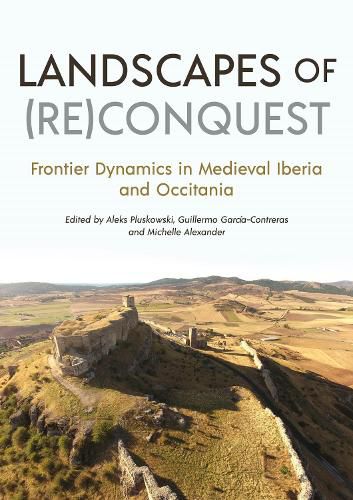Readings Newsletter
Become a Readings Member to make your shopping experience even easier.
Sign in or sign up for free!
You’re not far away from qualifying for FREE standard shipping within Australia
You’ve qualified for FREE standard shipping within Australia
The cart is loading…






Frontiers were an integral feature of every medieval polity, and their spaces were defined by opposing spheres of influence, contact and connectivity. As these polities expanded and contracted, often as a result of military conquest and territorial annexation, their permeable edges became defined by transformative cultural landscapes. Here, the encounters between native or resident and incoming populations, from small elite groups through to larger numbers of migrants from diverse social backgrounds, resulted in varying degrees of cultural hybridity. This came to define frontier societies, and left an enduring impact even as borderlands continued to move. They also saw the reconfiguration of political, economic and religious landscapes as frontier authorities invested in both old and new centers, with varying degrees of continuity. Today, the remains of their fortified residences represent the most striking monuments associated with former frontiers. They remain at the center of public narratives regarding state formation and cultural conflict. Adopting the definition of frontiers as both the spaces at the edges of polities and the composite societies resulting from their territorial expansion, this book presents a multi-disciplinary study of their dynamics. Focusing on the western Mediterranean, it draws on case studies of cultural landscapes shaped by two contrasting periods of conquest, regime change and state formation: the Castilian and Aragonese conquests of al-Andalus (Islamic Iberia) and the French annexation of Occitania following the Albigensian Crusade. Integrating perspectives from settlement and landscape archaeology, geoarchaeology, zooarchaeology, archaeobotany, archaeometallurgy and isotopic analyses, this book provides a new framework for the study of the transformative spaces of medieval frontier societies. AUTHORS: Aleks Pluskowski is Professor of Medieval Archaeology at the University of Reading, UK. He completed his PhD at the University of Cambridge in 2003. His main research interests include environmental archaeology, frontier societies and religious transformation in medieval Europe. Guillermo Garcia-Contreras is Profesor Contratado Doctor Indefinido at the University of Granada. He completed his PhD at Granada in 2013. His main research interests include the archaeology of al-Andalus, feudalism in Iberia and cultural landscapes. Michelle Alexander is Professor of Bioarchaeology at the University of York. She completed her PhD at Durham University in 2010. Her main research interests include isotopic and biomolecular analyses, food culture and multi-faith and multicultural societies in the medieval Mediterranean. 250 colour and b/w illustrations
$9.00 standard shipping within Australia
FREE standard shipping within Australia for orders over $100.00
Express & International shipping calculated at checkout
Frontiers were an integral feature of every medieval polity, and their spaces were defined by opposing spheres of influence, contact and connectivity. As these polities expanded and contracted, often as a result of military conquest and territorial annexation, their permeable edges became defined by transformative cultural landscapes. Here, the encounters between native or resident and incoming populations, from small elite groups through to larger numbers of migrants from diverse social backgrounds, resulted in varying degrees of cultural hybridity. This came to define frontier societies, and left an enduring impact even as borderlands continued to move. They also saw the reconfiguration of political, economic and religious landscapes as frontier authorities invested in both old and new centers, with varying degrees of continuity. Today, the remains of their fortified residences represent the most striking monuments associated with former frontiers. They remain at the center of public narratives regarding state formation and cultural conflict. Adopting the definition of frontiers as both the spaces at the edges of polities and the composite societies resulting from their territorial expansion, this book presents a multi-disciplinary study of their dynamics. Focusing on the western Mediterranean, it draws on case studies of cultural landscapes shaped by two contrasting periods of conquest, regime change and state formation: the Castilian and Aragonese conquests of al-Andalus (Islamic Iberia) and the French annexation of Occitania following the Albigensian Crusade. Integrating perspectives from settlement and landscape archaeology, geoarchaeology, zooarchaeology, archaeobotany, archaeometallurgy and isotopic analyses, this book provides a new framework for the study of the transformative spaces of medieval frontier societies. AUTHORS: Aleks Pluskowski is Professor of Medieval Archaeology at the University of Reading, UK. He completed his PhD at the University of Cambridge in 2003. His main research interests include environmental archaeology, frontier societies and religious transformation in medieval Europe. Guillermo Garcia-Contreras is Profesor Contratado Doctor Indefinido at the University of Granada. He completed his PhD at Granada in 2013. His main research interests include the archaeology of al-Andalus, feudalism in Iberia and cultural landscapes. Michelle Alexander is Professor of Bioarchaeology at the University of York. She completed her PhD at Durham University in 2010. Her main research interests include isotopic and biomolecular analyses, food culture and multi-faith and multicultural societies in the medieval Mediterranean. 250 colour and b/w illustrations